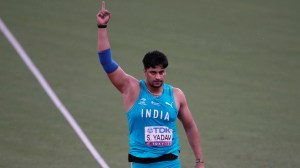First Gujarat verdict is Not Guilty, courtesy the cops
If this is a test case for justice, the victims have reason to worry. For, in the first verdict delivered in the Gujarat riots last week, al...

If this is a test case for justice, the victims have reason to worry. For, in the first verdict delivered in the Gujarat riots last week, all nine people arrested for setting shops owned by Muslims on fire here were set free.
This came after an unusually speedy trial that has raised several questions over the police’s sketchy chargesheet and its lax approach to the case.
The Joint District and Sessions Court took just two sittings—a full day on June 26 and a few hours on July 5—to acquit all the accused.
The reason, according to Deputy Superintendent of Police (Headquarters) B K Nanavati: ‘‘Nobody corroborated the police theory of the arrest of the accused from the scene of crime.’’ In other words, the police were not able to produce one ‘‘independent eyewitness.’’
Interestingly, counsel for the accused in court was BJP MP from Godhra Bhupendrasinh Solanki who had earlier threatened to lead a jail-bharo agitation to protest against the arrest of rioters.
The case, in brief: At least two dozen shops owned by Muslims were burnt in this town, in Panchmahals district, on February 27, within hours of the Sabarmati massacre, and the next day.
There was only one complainant Iqbal Surti, a wholesale grocery merchant, who, according to the FIR, suffered damage to the tune of Rs 5 lakh.
Like other shopkeepers, he left for home early pulling down shutters by 5 pm as news of the train massacre reached the town.
Late at night, he was informed his shop was on fire. Despite a curfew, he went and lodged a complaint around 3 am.
The state appointed special prosecutors Bhaskar Trivedi and Jagdish Patel to represent Surti. Claiming that the case fell because of ‘‘no independent eyewitnesses,’’ Trivedi said: ‘‘Why should the case take longer than this when no more witnesses were to be examined…The offence was proved but not against the accused.’’
Trivedi and Patel, incidentally, have been appointed prosecutors for at least 140 cases involving arson, looting, murder and rape in the Panchmahals district. Over 200 were killed here in the riots, over 30 are missing and 18,000 rendered homeless.
In the Surti case, there were several holes in the prosecution’s method:
• The police did not file an FIR although they arrested the accused. The FIR was filed by Surti who wasn’t an eyewitness.
• The police did not produce any ‘‘independent eyewitnesses.’’
• There were nine eyewitnesses, six of them policemen. There were 44 other witnesses, including shopkeepers, but theirs was hearsay evidence, hence they were not examined
• According to the complaint, the attack occurred between 8 pm and 10 pm on February 27, the police statements were recorded the next day, the day the VHP called a bandh and statewide violence broke out.
• The police claimed the nine accused were arrested from the scene of the crime but the timing on the arrest memo shows 10-hour delay.
Convenor of BJP’s Panchmahals legal cell Shantibhai Pandya has reason to celebrate. ‘‘Faulty investigation and non-availability of witnesses is going to make the prosecution’s job very difficult. This acquittal has indicated what lies in store.’’
VHP district secretary Rakesh Thakor, one of two lawyers who assisted Solanki, says there were ‘‘contradictions’’ in police statements which gave the accused the benefit of the doubt.
Photos



- 01
- 02
- 03
- 04
- 05




























